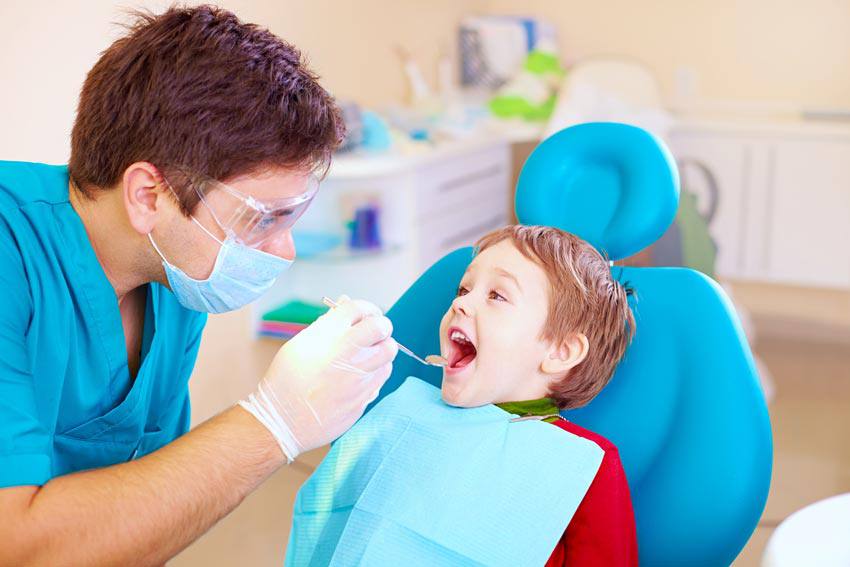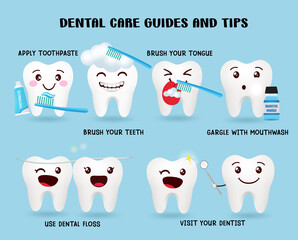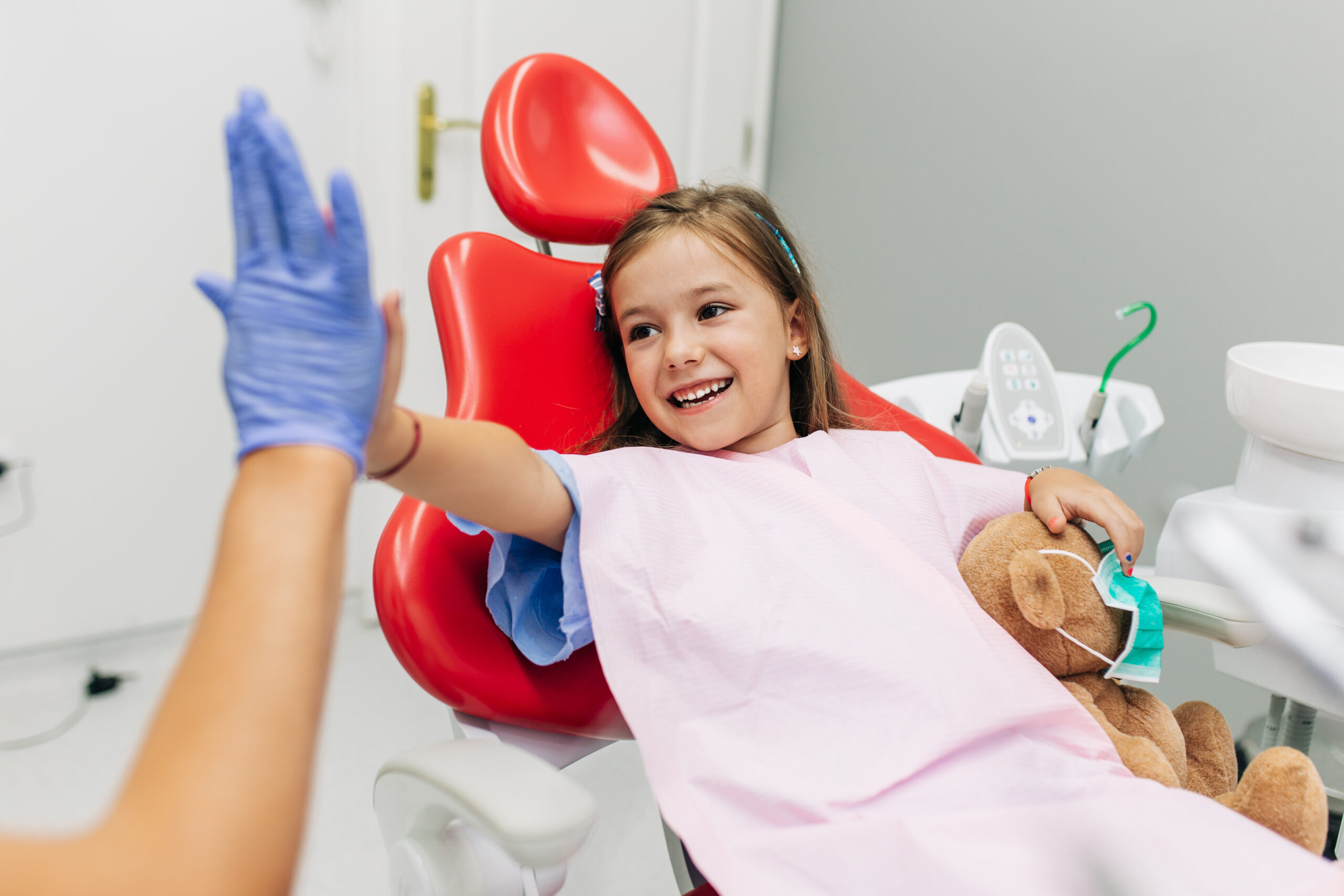Cavities, also known as dental caries, are the most common chronic disease in people under 18. Left untreated, tooth decay and gum disease can cause numerous harmful effects that interfere with healthy development and reduce your child’s quality of life. Children with dental problems often experience pain and discomfort, which can hinder their ability to eat, speak, and concentrate in school. Research has linked poor oral health to missed school days and lower academic performance among children, as well as reduced self-esteem and social problems.
By prioritizing oral health for children early on, you can support their well-being and give them the skills they need to maintain healthy teeth and gums throughout their lives. Regular dental check-ups are also essential to caring for your child’s teeth: Dentists can detect and address any potential issues early – before they worsen. In addition to preventing discomfort, these check-ups provide an opportunity for dental professionals to educate children and their parents on proper oral care techniques and the importance of a healthy diet for maintaining good dental health.

At our Mississauga dental clinic, we provide personalized recommendations during each dental visit, equipping parents with everything they need to care for their child’s teeth. As an experienced pediatric dentist, Dr. Oscar Dalmao also understands the importance of making children feel welcome and comfortable in the clinic. When you visit us, we’ll make every effort to ensure your child’s dental exams are a positive, worry-free experience.
Schedule your child’s first dental appointment today, or read on to learn more about the benefits of good oral health care for children:
1. Early Development and Habits
Research shows that kids develop long-term habits by approximately age nine. By teaching good dental care habits early, you will help your child develop a routine that becomes a lifelong pattern. Regular brushing and flossing will become second nature to them, ensuring consistent oral hygiene throughout their lives. Educating your child about the role nutrition plays in oral health is also a great way to encourage them to make informed choices that support their overall well-being – now and in the future.

2. Preventing Oral Health Issues
Good dental care habits help prevent cavities, gum disease, and more serious dental problems, such as infections and tooth loss. Likewise, taking care of your child’s primary teeth (also known as “baby teeth”) ensures that their permanent teeth will grow straight and benefit from a healthy oral environment. Untreated tooth decay in primary teeth can transfer to permanent teeth, while preexisting gum disease can weaken their support system, causing further dental problems.
For optimal oral health, teach your child to brush using the correct techniques for at least two minutes per session twice daily and show them how to floss correctly. Supervise your child while they brush and floss their teeth until they reach eight years of age, and use age-appropriate products.
To give your child added protection against tooth decay, limit sugary foods and drinks, provide high-fibre snacks, reduce snacking between meals, and encourage them to sip water throughout the day. Water rinses away food particles and neutralizes acids in the mouth, helping to prevent enamel erosion and keep teeth strong.
Early dental visits also play a crucial role in maintaining oral health: Seeking dental care before your child’s first birthday will allow your dentist to detect problems, such as bite misalignment, at a stage when they’re much easier to treat. Bite misalignment can lead to painful jaw joint disorders and problems with speech and chewing, making early treatment key to preventing the need for more invasive procedures.

3. Speech Development and Confidence
There is a strong connection between oral health and speech development in children. Teeth play a crucial role in articulating words and producing sounds. Dental issues, such as missing or misaligned teeth, can affect speech clarity and pronunciation, making it more difficult for a child to communicate effectively. For example, a child with missing front teeth may struggle with certain sounds, like “th,” “s,” or “f.” Similarly, misaligned teeth can contribute to lisping or other speech impediments.
Furthermore, oral health problems can cause pain and discomfort in the mouth, making it challenging for children to speak fluently and confidently. Dental pain can be a distraction, hindering a child’s ability to focus and convey their ideas. These limitations (along with the aesthetic concerns associated with decayed, missing, or misaligned teeth) can harm a child’s self-esteem and make them less confident when interacting with others. Ensuring your child has a healthy, attractive smile is therefore essential to encourage positive social development and self-expression.
4. Long-Term Health Implications
Dental problems aren’t the only consequence of poor oral health in children and young adults. Tooth decay and gum disease are linked to a range of adverse health outcomes, including cardiovascular disease, diabetes, cancer, and respiratory infections. By taking care of your child’s teeth, you’ll prevent the systemic inflammation that accompanies chronic gum disease, reducing their risk of developing these conditions later in life. Because the mouth is connected to the bloodstream and lymphatic system, untreated gum disease poses a significant threat to overall wellness.
Children with poor oral health often experience difficulties chewing and eating certain foods (especially fruits, vegetables, and other nutritious options); as such, tooth decay can also contribute to an imbalanced or inadequate diet. Nutritional deficiencies in childhood can slow growth and cognitive development and harm the immune system, making your child more susceptible to viruses and infections. For these reasons, seeing the dentist regularly is as vital to your child’s health as annual doctor visits.
5. Establishing a Dental Home
Another advantage of beginning routine dental visits early in life is creating a safe, welcoming dental “home” your child is familiar with. Maintaining a consistent relationship with the same dentist helps ensure that your child receives continuous care tailored to their unique oral health needs. It also promotes familiarity, trust, and effective communication, greatly reducing the likelihood that your child will develop dental anxiety.

Additionally, establishing a dental home facilitates comprehensive record-keeping, ensuring that the dentist has a clear understanding of your child’s oral health history, including any previous treatments, x-rays, or specific dental concerns. Having extensive, updated records helps your child’s dentist track the development of their teeth, gums, and jaw over time so potential problems are caught and corrected early.
Likewise, a dentist who has an ongoing relationship with your child will be better able to customize preventive measures (such as sealants, fluoride treatments, and oral hygiene instructions) to suit your child’s individual situation. This personalized approach can contribute to better oral health outcomes and make your child feel more at ease with their care plan.
Conclusion
Good oral health habits, such as regular brushing, flossing, and dental check-ups, contribute to maintaining a healthy mouth, which, in turn, supports speech development, academic success, and improved self-confidence. By promoting proper oral hygiene practices and seeking routine dental care, parents can help prevent painful dental issues and protect their children’s overall health.
For personalized advice and one-on-one help caring for your child’s teeth, trust the pediatric dental experts at Dr. Dalmao & Associates. Our team is committed to providing a positive dental experience for families and ensuring all children can enjoy a healthy, beautiful smile. Contact us today to schedule your child’s first dental appointment and learn more about our services.


